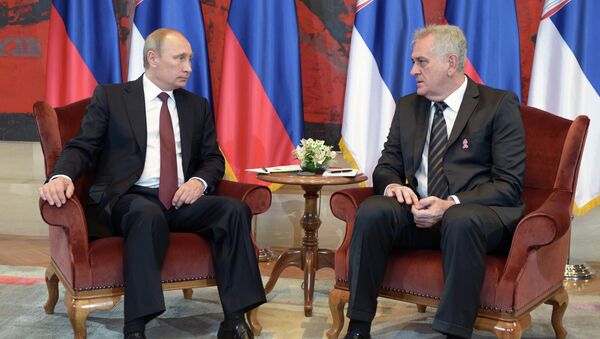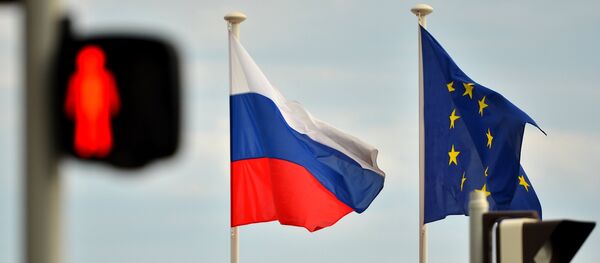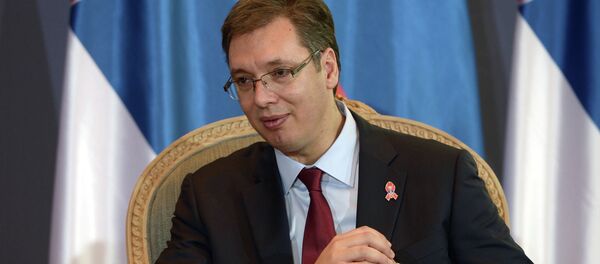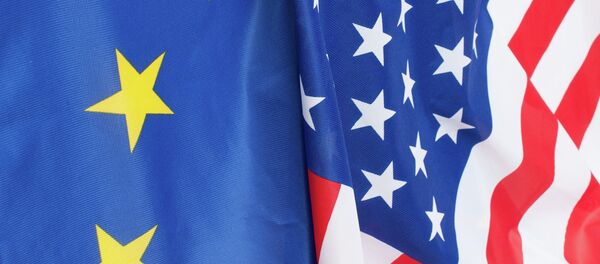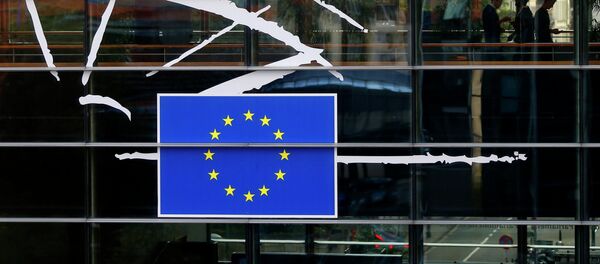MOSCOW, November 21 (Sputnik), Ekaterina Blinova — While Johannes Hahn, the EU Commissioner for Enlargement and Neighborhood Policy is urging the Serbian leadership to join European sanctions policy against Russia, experts express their deep concerns regarding the attempts of Brussels to "blackmail" Belgrade and raise the question of the price Serbia will pay if it withstands the pressure.
Last Friday, November 14, during a press conference in Brussels Mr. Hahn stressed that "when Serbia joins the EU it will have to align itself with our [EU] foreign policy and decisions." He underscored that the countries seeking EU membership "decide on the pace of their accession themselves, through their reforms," referring to Serbia's firm intention to join the EU.
"At the same time it is less about taking EU laws, and more about changing the culture and the thinking, as well as providing evidence those changes are sustainable," he said as quoted by Tanjug, a Serbian news agency.
During an official visit to Belgrade, on November 20, 2014, the EU Commissioner has again raised the issue of sanctions. In an interview with the Serbian Vecernje Novosti newspaper, Mr. Hahn stressed that since Belgrade declared EU accession as its "key objective," its foreign policy should be closely aligned with that of the European Union.
Press Conf w. Pres #Nicolic. Clarified that #Serbia must progressively align w. EU positions, incl Foreign Policy 1/2 pic.twitter.com/ZWa96a8jLv
— Johannes Hahn (@JHahnEU) November 20, 2014
Mr. Hahn's statement triggered a wave of criticism from political analysts.
"Presently the European Union is trying to force Serbia, which is not an EU member, to join their sanctions program. They are practically blackmailing Serbia: either it joins the sanctions against Russia or [the bloc] won't see it as a country with a chance of joining the EU," points out Russian MP Aleksey Pushkov as quoted by RT.
Dr. Gerhard Mangott, a Professor of Political Science at the University of Innsbruck and Scientific Adviser on Post-Soviet Affairs at the Austrian Institute for International Affairs (OIIP), asked Johannes Hahn on Twitter:
@JHahnEU @MiKarnitschnig Why is that? Doesn't Serbia have the right to its own policy trying to shape EU opinion once it becomes a member?
— Gerhard Mangott (@gerhard_mangott) November 20, 2014
Declaring his commitment to Serbia's EU perspective, President Tomislav Nikolić refuses to impose sanctions on Russia, citing the economic and longstanding historic ties of the two states.
"I heard from Hahn the same you did — that Serbia is not an EU member, that it is independent in conducting its foreign policy, but that EU membership would mean an obligation to conduct a common foreign policy. [Serbia] "today, these hours, these years, will certainly not impose sanctions on Russia," President Tomislav Nikolić told reporters as quoted by Tanjug.
Although Tomislav Nikolić asserted that Serbia would "definitely not introduce sanctions" against Russia in the coming years, he also admitted that civilians should prepare for all "the sacrifices" the state will have to make when it becomes a member of the European Union, Beta News, a Serbian newspaper reports.
Experts note that Brussels and Germany are extremely interested in involving the Balkan countries into the EU political and economic fold and are unlikely to postpone Serbia's EU membership for long. "In the long term, we want the western Balkan countries to become members of the European Union. It's our common economic, political and strategic interest," said Angela Merkel, the Chancellor of Germany, during a meeting of eight regional leaders in Berlin in August, as quoted by Bloomberg. The media outlet points out that "Merkel is seeking to guard a push for EU influence in a region," adding that some German officials expressed their growing concerns regarding the strengthening of the Russo-Serbian cooperation.
Still, Serbia's economy is largely dependent on the EU: two-thirds of all foreign investment attracted by the country is from EU member-states.
The West may try to force Serbia to join the European sanctions policy preventing further rapprochement between Moscow and Belgrade, using both economic and political instruments. In a similar situation, both Brussels and Washington have already begun a political campaign against Hungary's leadership, which confronts a "Cold War-style standoff" initiated by the West against Russia.
In response, Washington has banned six Hungarian public officials from entering the United States, "citing corruption allegations." Furthermore, The Economist has reported on anti-government protests in Budapest that brought together about 10,000 civilians, "encouraged by America's rising criticism of their government." The media outlet emphasizes that the EU and the US are dissatisfied with Hungary's current political course. "Concerns are growing inside Fidesz [Hungary's ruling party] about the wisdom of taking on the world's superpower," the Economist notes, adding that Hungary "is losing friends and allies."
Hungary's example once again shows that the EU member-states are evidently unable to conduct an independent foreign policy or establish economic ties with other countries without Brussels' or Washington's approval. The question remains open whether the US and the European Union will carry out a similar scenario in Serbia targeting the ruling elite or will continue threatening Belgrade with the postponement of its EU membership.
